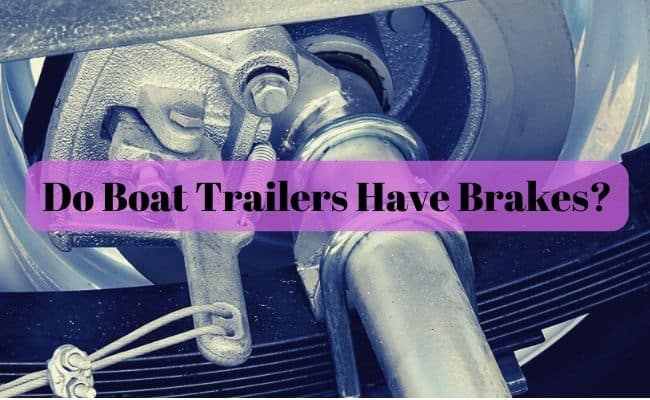Many people wonder if boat trailers are equipped with brakes. Some boat trailers also have disc brakes. Disc brakes are much simpler and more reliable than surge brakes. You can install a Flush kit to increase the life of your brakes. If you’re not sure which type of brakes you need, read this article to get the facts.
The difference between disc brakes and surge brakes is the power of the former. Disc brakes produce more pressure and power to slow down your boat trailer in the water. They are less likely to wear down and may be a better choice for freshwater boats.
Electric brakes must be installed with caution when working in salt water as the electrical components may corrode. Hydraulic surge brakes are easier to install and operate than electric brakes.
Disc brakes are less complicated to install and maintain than surge brakes and drums. They come with new bearings and seals and are easily replaced. Disc brakes for boat trailers are also more cost-effective than surge brakes, but you may need to follow the manufacturer’s instructions to ensure proper installation.
Disc brakes for boat trailers are compatible with both Al-Ko axles and Dexter axles. The braking system contains springs, pads, and magnets. These systems do not require a lot of adjusting. Disc brakes for boat trailers are also easier to replace than drums.
What Kind of Brakes Do Boat Trailers Have?
What kind of brakes should you look for on your trailer? Electric, Hydraulic surge, Disc, or Air brakes? Find out below. These are some important considerations when choosing a boat trailer. They should be corrosion resistant, preferably stainless steel or galvanized. If you’re not sure about the brakes on your trailer, you can also install a cheap flushing system kit to extend their lifespan.
Here are some types of brakes used on Boat Trailers;
- Electric Brakes
- Hydraulic Surge Brakes
- Disc Brakes
- Air Brakes
- Drum brakes
- Surge brakes
- Corrosion-resistant brakes
How Do Brakes Work on a Boat Trailer?
A boat trailer should have brakes. However, the brakes on a boat trailer are not always on the boat itself. They may also be on a trailer, which is why this article focuses on the latter. In addition, we’ll discuss the difference between drum and surge brakes. Learn how to operate the brakes on a trailer and how they affect your boat.
Electric Brakes
You can find electric brakes on boat trailers for a few reasons. They are less expensive than load guides, and they’re also easy to maintain. The disadvantage, however, is that they are not as good as surge brakes. Electric brakes may cause corrosion, and they’re less effective in light-duty applications. If you’re considering getting electric brakes for your boat trailer, make sure you know the pros and cons.
Generally, you should check the brakes before every trip. If they’re not working properly, it’s time for a new set. Make sure the brake fluid is topped off before you go on a long trip, and check the tires. You should also have the brakes inspected annually. It’s also a good idea to have the brakes checked if you’re towing your boat long distances. Your trailer may have additional requirements, so make sure you’re up to date on these.
Hydraulic Surge Brakes
Boat trailers equipped with hydraulic surge brakes have an automatic braking system that releases the load of the boat when the tow vehicle applies the brakes. A surge brake system works by using a surge actuator inside the trailer to release the load as it approaches a stop. The surge brake system works by sending a surge of energy into the master cylinder. The surge brake extends as the tow vehicle begins to move forward and releases its brakes.
A conventional surge system works by using the tow vehicle’s brakes to apply pressure on the tow vehicle. However, a boat is typically heavier than a vehicle, which puts more strain on the brake system of the tow vehicle. An EOH works by using the brakes of both the tow vehicle and the trailer to prevent a boat trailer from pulling away from the trailer. A hydraulic surge brake system can be easily converted to an electric brake system for a boat trailer.
Disc Brakes
Disc brakes on boat trailers can be problematic and need constant maintenance. If your trailer has a drum brake system, you will need to replace the rotors every three to five years. This is because drum brakes wear out and require more hydraulic volume for each stroke. In addition, you may need to adjust the brake cylinders to prevent them from overheating and locking up. Disc brakes also require manual adjustment.
Disc brakes on boat trailers provide 100 percent braking force in both directions. When choosing a disc brake system, check the weight of the trailer. Also, consider the number of axles that will be equipped with brakes. Some manufacturers pioneered the use of stainless steel guide bolts, sleeves, and pistons, as well as brass fittings for preventing corrosion. The Kodiak company has long been a leader in this field.
Air Brakes
Boat trailers with air brakes are typically fitted with a single-pushrod wheel cylinder, which is connected to a separate power source. These systems have a brake pedal with a pressure-sensitive pad, which is used to control the braking force on the boat trailer.
Unlike conventional air brakes, which need to be disconnected when going in reverse or backing down the ramp, these systems are more effective when used with a controller for the tow vehicle. They are also less expensive than conventional braking systems and are more flexible than their counterparts.
Air brakes on boat trailers are not as effective as conventional brakes, and may not even be effective if the trailer has a low-quality or old-fashioned brake system.
Can You Put Brakes on a Boat Trailer?
You can install brakes on your boat trailer if it has the necessary components. Some types of brakes include Disc, Hydraulic surge, and Electric. Discs provide 100% braking power. These types of brakes can also be used for passive applications. For most applications, an electric brake can be installed. Electric brake conversion kits include the actuator, wiring, and controller. You can also add additional brakes for extra safety and comfort.
To put brakes on your boat trailer, you should first determine the weight of the boat. This weight includes the boat, gear, and trailer itself. For heavier trailers, brakes are required. Depending on the type of boat trailer, it can either be hydraulic or mechanical override brakes. In either case, the brakes should be installed properly and securely.
Electric brakes are also an option. However, they should only be used in freshwater. This is because saltwater interferes with the electric brakes. They can also be dangerous if mixed with water. In addition, electric brakes are easily adjustable. Electric brakes are becoming more popular with boat trailer manufacturers, and some high-end trailers even have a built-in electric brake system. While it is not recommended for marine use, the safety benefits are clear.
At What Weight Do You Need Brakes on a Boat Trailer?
At what weight do you need to install brakes on your boat trailer? Not all boat trailers come with brakes, and not all states require them. Additionally, If the combined weight is over 750kg, you need brakes. Personal watercraft trailers usually don’t come with brakes, but aftermarket brakes can be installed in those trailers as well.
To safely tow a boat trailer, you must have working brakes on your tow vehicle and the trailer. Depending on the state you live in, the combined length of the trailer and the tow vehicle can range from 30 to 60 feet. If your trailer is longer than that, you can tow it with an oversize load permit, but there are some restrictions.
In general, any trailer weighing more than 3,000 pounds must have brakes, but in some states, you may be able to tow it with no brakes at all. Brakes are a good idea on any trailer weighing more than three thousand pounds, but they must be properly installed on any axle that may be pulling the trailer.
Which Boat Trailer Brake Type Should I Use?
There are many differences between disc and drum brakes. If you’re new to boat trailers, it’s helpful to know the basics before you purchase one. To make the buying process easier, here’s a comparison chart of brake types. Each type is designed for different applications. Here are some things to keep in mind:
Overrun Coupling
If you own a boat trailer, you’re probably wondering which brake type to use. The answer will vary depending on your boat’s size and usage, as well as your lifestyle and environmental conditions. Listed below are some factors to consider when selecting a boat trailer brake. Keep reading to learn more about each type and what they can do for your boat trailer. Then, shop for the best option for your budget and needs!
Flush Kits
A boat trailer’s brakes are essential for safety. They prevent your trailer from towing your boat if they malfunction. Boats are quite heavy, and without proper trailer brakes, stopping can be a nightmare. There are many reasons why trailer brakes should be installed. If you’re using an older trailer, you need to get them properly equipped before you start towing it. A simple checkup can prevent problems before the boating season even begins.
Maintenance
Proper maintenance of your boat trailer’s brakes is vital to prevent corrosion. Regular flushing is necessary to remove rust from brake disks and backing plates. You should also check the brake fluid level to ensure it remains at a safe level. Fluid levels naturally decrease with age, and if they are low, there may be a leak somewhere in the brake lines. If you suspect this, contact your boat trailer service center. Finally, you should check the trailer lights for proper functioning.

